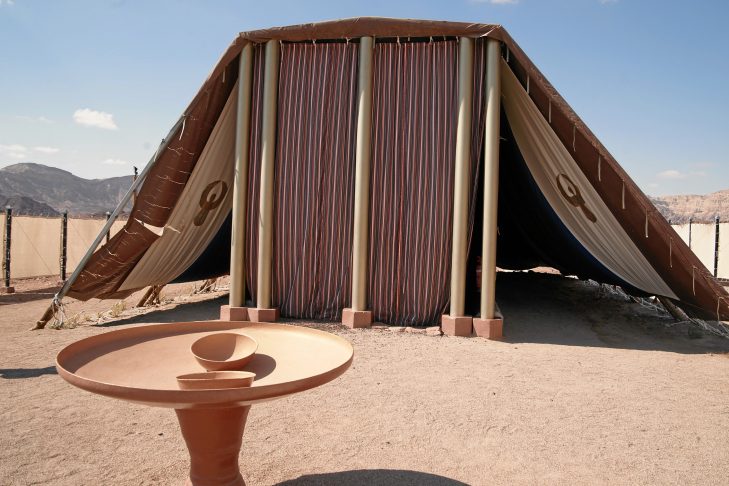Speaking with a woman in hospice care, she told me she could not watch the news anymore because it depressed her too much. Though she was facing the end of her life, the turbulence of these times was utterly unbearable to her. In her despair I saw reflected back to me my own certainty, as I look into the public sphere, that our society is stuck. Her hopelessness touched my own fear that things will not change.
Torah counters this belief by showing that change is built into the very fabric of creation—that ordinary moments are precisely the times we can access our extraordinary power to unearth alternatives, and from which we can build grounds for new hope. This week, God gives Moses the blueprint for the Tabernacle, the space that will serve as a meeting place between the Israelite people and God in the wilderness.
These detailed instructions describe an ornate, golden sanctuary. But in the middle of this blueprint, God tells Moses to include a set of tongs for removing the menorah’s burnt wicks in the design of the Tabernacle’s golden menorah. Tongs are not beautiful, nor do they serve an especially useful function in this domain. In the midst of this shining splendor, why are tongs mentioned in the Divine instructions to construct the Tabernacle?
A clue lies in a list of miraculous objects created during the twilight on the sixth day of creation, including Miriam’s well, Moses’ staff—and a pair of tongs. Rabbeinu Yonah, a 13th-century commentator, says the tongs are mentioned in this list to “make known that all the Holy One created, was created on condition that it change its nature when it is told, at a time when it is needed…and that these objects are included in the things that have change embedded in them.”
This list contains wondrous things—the staff that parted the Red Sea, and the miraculous well that quenched the Israelites’ thirst in the desert. The tongs, once again, do not seem to belong here. But there is a reason that, of all the objects in the Tabernacle, the most ordinary one is created during the twilight. By including the tongs on this list, the rabbis assert there is vast potential tucked away in seemingly unremarkable objects and moments. The tongs represent all of the powerful resources that are within our reach.
Perhaps our willingness to discover the miraculous in the everyday is our most effective antidote to despair. Rabbeinu Yonah teaches, when its moment comes, each object mentioned in this list—and possibly many more we do not yet know about—will miraculously transform its nature so it can perform the extraordinary feat it was ultimately created for. If a pair of tongs has the capacity to change its very nature, what else do we believe cannot change that, as a matter of fact, has buried within it the seeds of its own transformation?
Our certainty that things cannot change offers us psychological protection by forcing us to abandon our expectations. But it also obscures the reality that change is a property intrinsic to everything that exists—our bodies, our relationships, even our social and political institutions. Opposed to our surety, hope locates itself in the premises that we do not know what will happen, and that in the spaciousness of that uncertainty is room to act. Torah invites us to imagine all that is still unknown sitting in the twilight, waiting to be thrust into history in order to embrace an alternative to the certainty of both optimists and pessimists—which excuses both groups from acting.
The tongs stand for all the power stored in the margins, the hidden places, the moments we might otherwise overlook. These twilight objects are the creative possibilities that are waiting in the wings of our public imagination to change the very course of history. Hope is what happens when we turn our attention away from the limelight of the world stage, where the powerful appear to keep gaining power—and instead peer into the twilit margins, where we can perceive the capacity for transformation built into the fabric of the universe.
Next time you pick up a pair of tongs, remember that the tools you need to make the change you want to see in the world are already here—usually in the most unexpected of places.
Rabbi Adam Lavitt is Rabbi-Chaplain at Hebrew SeniorLife. He graduated from the Rabbinical School of Hebrew College in 2012, and served as assistant rabbi at Congregation Dorshei Tzedek and campus rabbi at Swarthmore College. He has been a CLAL Rabbis Without Borders Fellow and a JOIN for Justice Clergy Fellow, and recently became a Jewish spiritual director through the Bekhol Levavkha at Hebrew Union College. He lives in Providence with his partner, Alex.
This post has been contributed by a third party. The opinions, facts and any media content are presented solely by the author, and JewishBoston assumes no responsibility for them. Want to add your voice to the conversation? Publish your own post here. MORE


